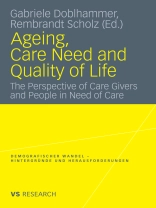Steadily increasing life expectancy is one of the great achievements of industrialised societies over the last century. Life expectancy has not only been growing among the young and those reaching retirement age, but also, especially in recent decades, among people ages 80 and above. These improvements in life expectancy have led to the emergence of the so-called third age, when people retire, but are still you- ful, healthy and able to participate in society. Nevertheless, closer to the end of life, a fourth age of decrepitude and dependence on others has to be anticipated. – spite the postponement of functional limitations and severe disabilities into higher ages, the debate continues over whether the additional years gained are healthy years, or years with severe care need, particularly among the oldest old, the fastest growing segment of the population. Future improvements in life expectancy and the health status of the elderly will determine the need for care in the future. While different assumptions about these trends based on expert opinion or the extrapolation of past experiences can be made, there will always be a degree of uncertainty about future trends. A third – portant factor driving the extent of future care need is, however, already determined by the history of the past century and is embedded in the age structures of our populations.
Daftar Isi
Projections of Care Need and Care Resources.- People in Need of Long-term Care: The Present and the Future.- Care Need Projections for Germany until 2050.- Care Need Projections by Marital Status and Childlessness for Germany 2000-2030 based on the FELICIE Project.- Projection of Care Need and Family Resources in Germany.- Cohort Trends in Disability and Future Care Need in Germany.- Projections of the Number of People with Dementia in Germany 2002 Through 2047.- Health Factors and Care Determinants.- The Effect of Sex, Obesity and Smoking on Health Transitions: A Statistical Meta-analysis.- Demand for Long-term Residential Care and Acute Health Care by Older People in the Context of the Ageing Population of Finland.- Old Age, the Need of Long-term Care and Healthy Life Expectancy.- Trends in Individual Trajectories of Health Limitations: A Study based on the German Socio-Economic Panel for the Periods 1984 to 1987 and 1995 to 1998.- Care Givers.- Perceived Care Giver Burden of Spouses and Children in Flanders: Who’s Feeling more Burdened and Why?.- Voluntary Care Giving in the Life Course of Women in Eastern and Western Germany.
Tentang Penulis
Prof. Dr. Gabriele Doblhammer is Professor for Empirical Social Science and Demography at the University of Rostock and Director of the Rostock Center for the Study of Demographic Change.
Dr. Rembrandt Scholz is Research Scientist at the Max Planck Institute for Demographic Research, Rostock.












